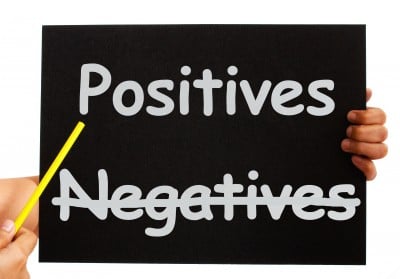
Say you have done the near-impossible, and gotten an amazing SAT score of 2200 or higher or an ACT score of 32 or higher. Many high school students across the country are probably jealous of you!
But what if your GPA is much lower – a 3.0, or even a 2.0? Do you still have a shot at top colleges? What will admissions officers think about you?
Read on to find out what to do with a low GPA, high SAT/ACT score application. That high score could be worth a lot more than you think!
The Good News
Your high SAT/ACT score proves your academic abilities and intellectual aptitude. While it’s possible to have a high GPA without being super smart (since some schools inflate GPAs), it’s almost impossible to get a high SAT/ACT score if you don’t have significant intellectual ability. Colleges know this.
Since the SAT and ACT are national, standardized tests, if you do well on them you'll stack up very favorably compared with the entire applicant pool. For example, if you have a 34 ACT, that means you scored higher than 99% of the country.
Having a 4.0 GPA, on the other hand, doesn’t allow colleges to easily compare you to other students. This is because grading scales and class difficulty varies among high schools.
One other thing to keep in mind is that applying to schools where your SAT/ACT score is above their average admitted student score raises your odds of admission because your score will raise the schools' averages. Remember, colleges are also trying to maximize their score profiles, and getting students with higher SAT/ACT scores to apply can make them look good.
The Bad News
Your transcript and GPA are very important, especially for competitive schools. Stanford says on their admissions website, “We expect you to challenge yourself throughout high school and to do very well. The most important credential that enables us to evaluate your academic record is the high school transcript.”
Why is the transcript – including your GPA – so important? Because your GPA shows your performance over a long period of time, as well as your ability to succeed in tough classes. This is important to help colleges decide if you will be able to succeed in their classes.
If you’re a junior or senior with a low GPA, you don’t have a lot of time to raise it before you turn in your college applications. So what can you do?
We will tell you what colleges might think about your low GPA and high ACT/SAT combination, questions they will have, and tips for you based on what your exact circumstances are.
How Low Is Low?
Of course, just how low your GPA is will affect your odds of admission. There is a huge difference between a 3.5, which would be considered low at selective colleges but well within range at many state schools, and a 2.0, which is considered low at most colleges.

Also make sure you're not being hard on yourself... you may think your 3.9 GPA is low, but most colleges won't.
Find out what the admitted student GPA range is at your target schools. You can do this by searching “[Name of College/University] Average GPA Admission” or “[Name of College/University] Admission Requirements.”
If your GPA is just out of range, your high SAT/ACT score will likely make up for your GPA, especially if the rest of your application is strong.
But if your GPA is far below their range, it will be especially important to use your application to explain why your GPA is low.
So if you’re reaching for a tough college, or have a way out-of-range GPA, read on to find out what to do!
What Do Colleges Think of Your High SAT/ACT and Low GPA?
If you have a high SAT/ACT score but low GPA, admissions officers will assume your academic potential is high – your SAT/ACT score shows that – but that your motivation is low, hence your low GPA.
A “smart slacker” could be the first thing that comes to mind when an admissions officer reads your file.
So what you have to do is prove that assumption wrong. Whether you have personal circumstances leading to a low GPA, a demanding extracurricular, or other academic preparation outside of high school classes, your goal is to show that not only are you smart – but you can also work hard and do well in college.
We will go through a series of scenarios, guided by the main questions admissions officers will be asking, about why your GPA is low and what it means. For each scenario, we have some specific advice, but read through all of them as your situation is likely unique and combines multiple scenarios.
Why Is Your GPA Low?
This is the big question admissions officers will have when they see your application. This is the question your application has to satisfyingly answer, especially if you want a shot at top colleges.
We will explore the two circumstances most likely to excuse a low GPA. Don’t worry if these don’t apply to you – we have plenty more advice coming!
Scenario 1: Extenuating Circumstances
If you have serious extenuating circumstances like a medical condition or family crisis, definitely explain them on your application. This would fit in the “extra information” box for sure, but it could also be good material for your personal statement.
For example, if you have a low GPA because your family had financial troubles, both of your parents started working long hours, and you became the primary caretaker for younger siblings and didn’t have time for homework, that should definitely be on your application as part of your story.
Or if your grades suffered due to a medical condition, you should definitely make that known on your application.
In short, if you had serious outside circumstances that affected your grades, make sure you explain them thoroughly on your application. You want to make sure colleges know that, in your case, your GPA wasn’t entirely in your control.
You should highlight academic interests and classes you did do well in, but the explanation of your circumstances will be the best way to help admissions officers evaluate your file fairly.
Scenario 2: You Spent Tons of Time on an Extracurricular
If you spend a lot of time on an extracurricular – say you’re a debater who’s been to nationals or an award-winning flute player – at the expense of classes, it won’t excuse a low GPA, but it will improve your chances.
In addition to top scores and high GPAs, colleges are also looking for exceptionally talented students in specific fields. If you have an exceptional ability, it could overcome a low GPA, especially with your high ACT/SAT score. Any extracurriculars done at the national level will look especially good.
Do neither of these situations apply to you? Keep reading.

If you've played Carnegie Hall, colleges will probably be fairly forgiving about that C in Biology...
What Kinds of Classes Were You Taking?
A low GPA in hard classes will look better than a low GPA in easier ones. You should think about the pattern of grades you received and why you got low grades where you did.
College admissions officers will be trying to figure out this pattern too, so make it easier for them and explain whatever pattern you have. For example…
Scenario 3: You Took Hard Classes and Got a Low GPA
Did you overload yourself with too many hard courses and struggle to keep up? In your essay, you could talk about what you learned from taking on too much at a time and how you will be more careful and focused in college.
Since you were in those hard classes, you should also highlight what you learned and any intellectual development you experienced. For example, even if you got a low grade in AP Biology, maybe taking it convinced you that you want to explore pre-med courses in college and so you began volunteering at a local hospital or signed up for a medical anatomy class.
That kind of journey would show colleges that you have serious interests, and even if your grades aren’t high, you are capable of doing hard work and improving.
Scenario 4: You Took Easy Classes and Got a Low GPA
Were you uninterested by easy classes at your school, and ended up slacking off? This will be a harder sell, but if you were in mostly regular classes (not honors or AP or IB) and got a low GPA, you could argue you simply weren’t interested by your classes and had a hard time keeping up with menial assignments, but did have intellectual pursuits in your free time.
The above argument will be more compelling if you went to a high school without very many honors, AP, or IB options.
Your application would also be strengthened if you have a career goal in mind and do well in certain classes related to it. For example, if you want to be a lawyer and manage to pull decent grades in English and History, it could help convince admissions officers that despite your slacking in other classes, you will be able to pull together and focus on your major in college.

Hint: video games don't count as an intellectual pursuit (unless you design them).
What’s Your Grade Trend?
While a high GPA is important, so is an overall trend of improved grades or harder classes year to year. Whether you have a rising grade trend or a sinking one, read on to learn what it means and how it affects your applications.
Scenario 5: You Started With Low Grades but Improved
If you’re reading this as a sophomore or junior, work to improve your grades starting now. You won’t be able to totally fix your GPA, but you will be able to show a story of improvement, which can be just as important. A pattern of improved grades shows that you fixed issues you had with time management and have gotten better at handling assignments and tests.
This growth is important because it shows admissions officers you can continue to grow and improve in college. This will look especially good if you have been succeeding in honors, AP, or IB classes later in your high school career, as it suggests you are learning the skills needed to succeed in college.
If you have this pattern on your transcript, definitely spend some time on your application explaining why you struggled at the beginning of high school, and what caused you to improve your grades. Along with a high ACT/SAT score, an improved GPA can convince colleges you are academically prepared.
Scenario 6: You Started With High Grades but They Dropped
If you started with great grades and your GPA has fallen, you’ll have to explain why. Took on too many hard classes? You became overly involved in a sport or extracurricular? Illness in the family?
It will also be especially important to prove you have other academic or intellectual interests, like we will discuss below.
A lowering grade trend is more worrisome to colleges because it suggests you had a hard time coping with harder classes later in high school, or even that you’ve burned yourself out before college.
You will have to prove that you have strong academic interests and are capable of doing well, despite your trend of sinking grades. One way to do this is to take a few Honors, AP or IB classes senior year and make sure you do well in them.
Colleges will see a mid-year grade report, so if they see that you have taken on harder classes and are doing better, that will reassure them that you are capable of doing well in college courses.
Another way to reassure colleges is with SAT Subject Tests. Some colleges require them for admission, some don’t, but nearly all will consider them. Getting high SAT subject tests scores will help convince admissions officers that you’re academically capable in certain subjects.
If you haven’t taken any SAT Subject Tests yet, consider it – many students take them late in the game (even in Senior fall). If you are confident of your ability on tests, and you have even a bit of time to devote to studying, a high SAT subject score or two could help prove your ability in academic subjects and help overshadow your GPA.

If your GPA trend looks like this, you have some explaining to do...
Can You Prove Your Academic Preparation in a Different Way?
If your GPA is low and you don’t have a good reason for it, your task will be to prove to colleges you are still academically prepared, despite your low GPA. Your high ACT/SAT score is the first step towards proving yourself, but also consider other ways you can show your smarts…
Scenario 7: You Have One Weak Subject
Is there a certain subject you struggle in? Is your GPA low because you have Ds in math but As and Bs everywhere else? If so, you should highlight your strengths in other subjects.
For example, If you have great grades in English classes, highlight that on your application and talk about what draws you to English and why you enjoy it. Show that you have strong intellectual interests in your best subjects, which you can do through your personal statement or college supplements on the Common App.
If you have done outside work or an extracurricular related to these classes, even better. For example, if you’re great at English and history and spend time outside of class in Mock Trial, you can talk about how your interest in law drives you to do well in history and English. This won’t totally excuse low math grades you might have, but it will show colleges you have strong academic interests.

Help colleges focus on the positive!
Scenario 8: You Took and Passed AP or IB Exams
Did you take and pass AP or IB exams? For example, even if you got Cs all year in World History but passed the test with a 4, that at least proves you mastered most of the material.
If this is the case for you, highlight exams you did well on and talk about your intellectual interest in those subjects. You could address why you didn’t do well in the classes in the “extra information” box, but focus on explaining your academic interests and how you want to continue pursuing them in college in the personal statement.
Remember, you want to demonstrate your academic abilities to colleges. A passing AP/IB score is an important piece of evidence, so follow it up with an essay further explaining your interests!
Scenario 9: You Took Outside Enrichment Classes
Whether you attended an academic summer camp or took an extra course or two at a community college, definitely put that information on your application. It won't make up for your low grades, but it will show colleges that you are serious about your intellectual pursuits and made time outside of school for learning.
This can be especially helpful if you get an additional letter of recommendation from a professor or instructor you worked with.
Scenario 10: You Have Academic Interests Outside of School
So your GPA is low, but do you do things like read War and Peace in your spare time? Have you learned a coding language on your own and designed your own app?
If you can’t show your academic preparation through any high course grades or AP/IB exam results, find a way to include outside academic interests in your application. If you’ve attended Hackathons or entered writing contests, fit that into your application under extracurriculars. This kind of outside interest could be great material for a personal statement as well.
Basically, if you have academic preparation or interests that are not going to show up on your transcript, make sure they show up on your application! It will be reassuring to admissions officers to see you have outside intellectual pursuits.

Writing code is a more acceptable excuse for slacking off in Algebra than watching television...
How Can You Compensate With the Rest of Your Application?
College applications are holistic, meaning they consider the candidate as a whole. GPA is just one factor. While it’s an important factor, if everything else on your application is strong you can improve your chances of admission.
Having a high SAT/ACT score is your big advantage because you won’t be weeded out immediately based on your score. Read on to see how to maximize the other categories.
Personal Statement
Your essay is another opportunity to prove yourself. If you had significant extenuating circumstances, you could talk about them here. If you were bored and slacked off, use the essay as a space to explain an intellectual interest or hobby to offset your low GPA.
No matter what you write about, make sure your essay is well-written and presents your unique voice.
Remember – you no longer have control over your GPA, but you have complete control over your essay and how it presents you. Use it wisely!
Extracurriculars
Do you have any other extracurriculars that speak to intellectual aptitude? Math competitions, Model United Nations, writing for the school newspaper – these are the kinds of extracurriculars that support academic interests. If you have them, definitely highlight them.
Extracurriculars in the arts – from musical instruments to drawing to theater – are also great because they speak to interests outside of the classroom.
You should also talk about your involvement in sports, since that excelling in them requires both discipline and teamwork skills.
In short, you should highlight any extracurricular activity you have, even if you don’t think it’s significant. Extracurriculars can help show colleges you have outside interests, discipline, and the ability to work with others. These are all important factors, but can also help make up for a low GPA.

Teacher Recommendations
For your letters of recommendation, find teachers who can either speak to your personal circumstances or believe in your academic potential. You want to make sure your recommendations are supporting evidence for your application, not contradicting information.
For example, if your GPA is low due to an illness, find a teacher who can speak to your perseverance when you were sick, or how hard you worked once your condition improved.
If you don’t have extenuating circumstances like that, make sure you find teachers who have great, specific things to say about you and your academic potential. Maybe you have an English teacher who always loved your essays or a math teacher who often called you to the front to explain problems on the board. Find teachers who recognize your abilities and would write you a kind letter.
Don't get a teacher to write a letter just because they taught you in a hard subject. If a recommender doesn't have specific things to say about you, the letter won't help your application.
If you’re not sure you can get an amazing recommendation from a teacher, many colleges allow an additional letter to be submitted, from someone like a coach or boss. Find a third person who you know will speak very highly of you and use them for that third letter.
Where Are You Applying?
Your odds of admission will also depend on where you’re applying. For example, say you have a 2360 SAT but a 2.7 GPA.
While your SAT would make you competitive for the Ivy League, it will be harder to overcome your low GPA at highly competitive schools. They simply have too many applicants with both high test scores and high GPAs to admit many people with a serious deficiency in either.

That 2360 alone won't get you into Harvard...
However, if you apply to less competitive schools where your SAT is far above their 25-75 percentile ranges, you would actually be quite a desirable candidate since your SAT score would raise their averages. (The 25-75 ranges are the score ranges that the middle 50 percent of colleges’ accepted students fall in. For example, a 25-75 range of 24-30 ACT means that 25% of applicants scored lower than a 24, 25% scored higher than 30, and the middle 50% were between 24 and 30.)
Furthermore, a less competitive school will be more forgiving of a weak spot on your application, in this case your GPA, as opposed to a very selective school.
As a general rule, it’s important to apply to a range of colleges. Don't just apply to all eight Ivy Leagues hoping that one will let you in. Apply to a few schools that are reaches given your GPA and ACT/SAT combo, a few that are safe targets, and a few that you think you will definitely get into, like state or community colleges.
You want to make sure you have some choices when it’s time to decide which college you’ll attend.
What’s Next?
Learn about automatic scholarships for SAT/ACT scores. While colleges usually factor in GPA or Class Rank, see how far your high test score can get you.
Want to use SAT Subject Tests to raise your chances of admission? Learn which colleges require SAT Subject Tests for admission.
Check out our SAT/ACT Percentile rankings guides to see just how much your high score stands out.
Want to improve your SAT score by 160 points or your ACT score by 4 points? We've written a guide for each test about the top 5 strategies you must be using to have a shot at improving your score. Download it for free now:
Have friends who also need help with test prep? Share this article!

Halle Edwards graduated from Stanford University with honors. In high school, she earned 99th percentile ACT scores as well as 99th percentile scores on SAT subject tests. She also took nine AP classes, earning a perfect score of 5 on seven AP tests. As a graduate of a large public high school who tackled the college admission process largely on her own, she is passionate about helping high school students from different backgrounds get the knowledge they need to be successful in the college admissions process.



































 Holly R.
Holly R.